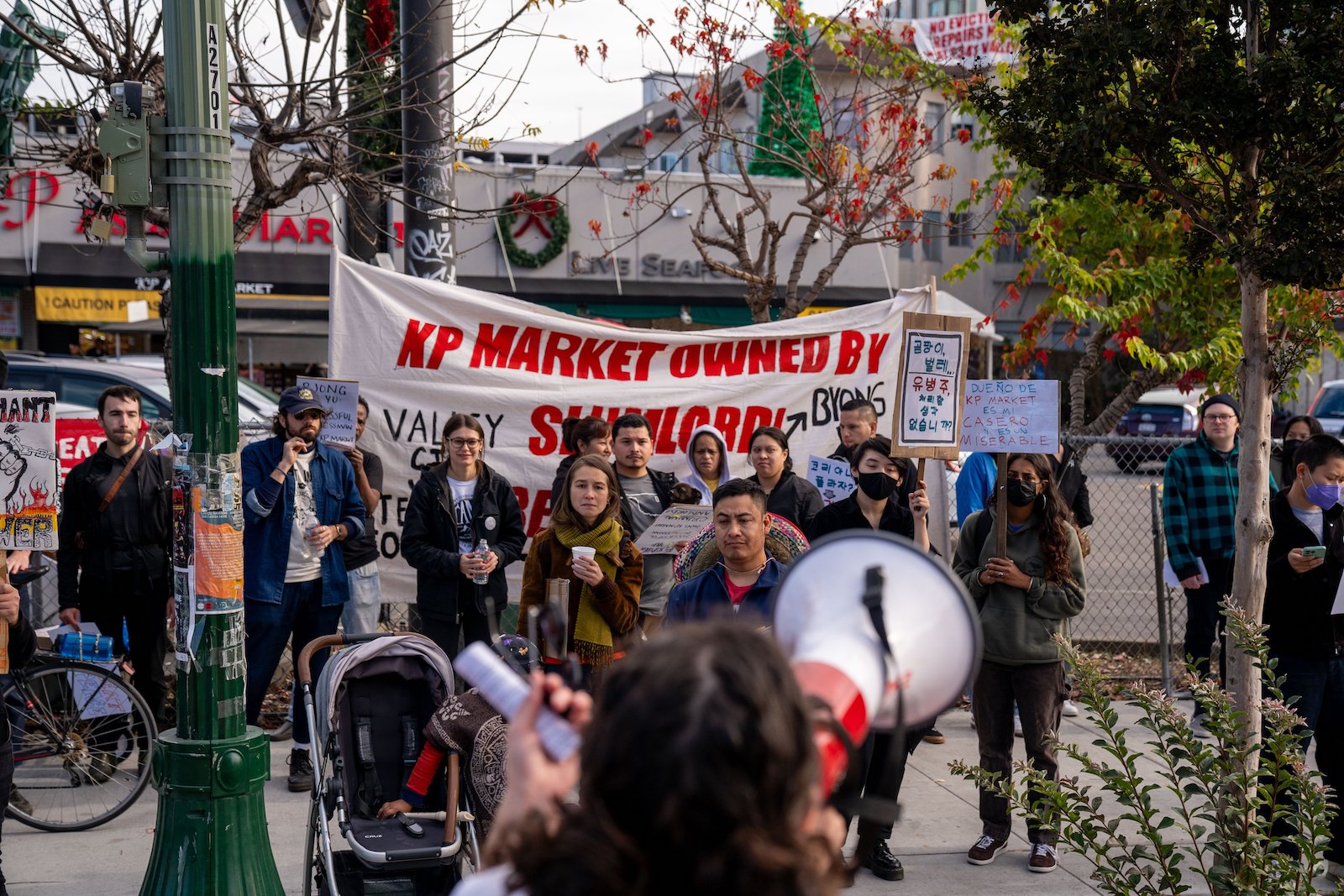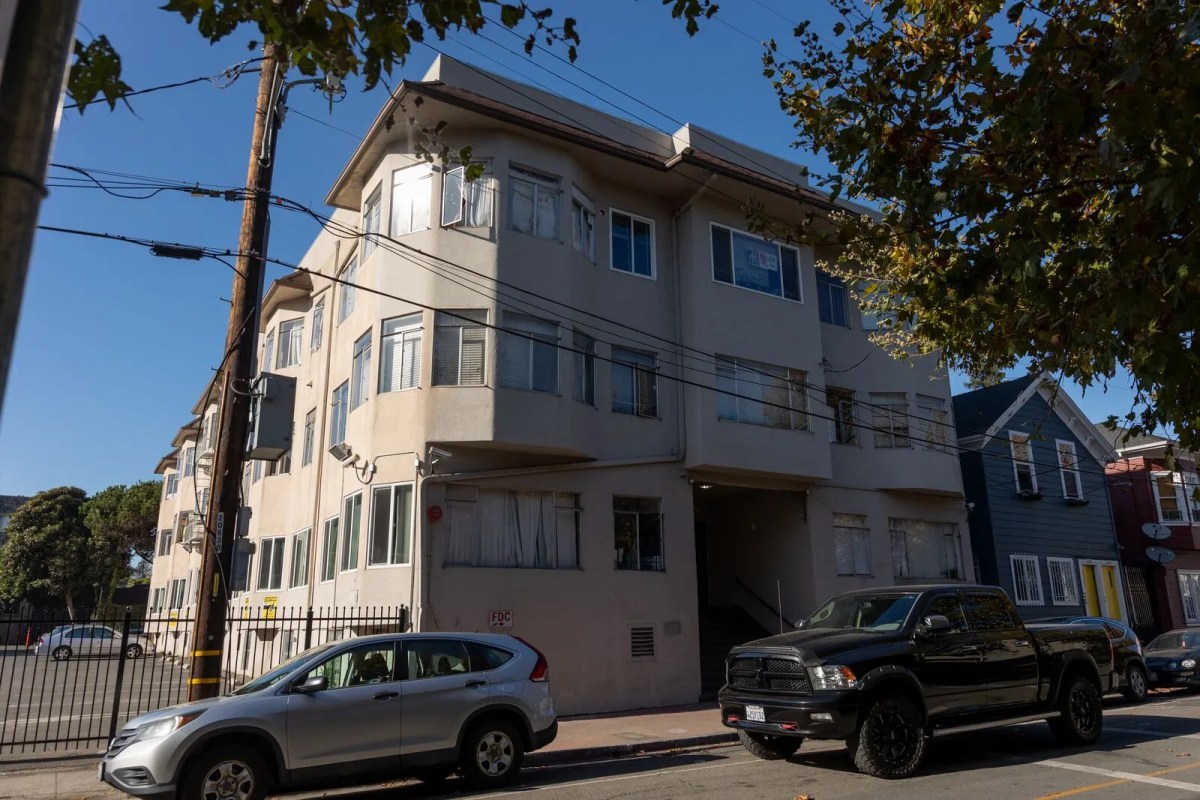Renters in Uptown say their landlord—who also owns the nearby Koreana Plaza Market and several other properties—has long neglected the freezing temperatures, mold, cockroaches, and leaks that plague their building.
The tenants recently picketed in front of the popular grocery store, also called KP Asian Market, and say they’ll call for a boycott if the conditions in their homes aren’t addressed.
“It really feels like we’re being tossed aside and not worthy of dignified housing,” said Irena Allen-Maestas, who moved into the 41-unit Valley Street building in 2021.
The property is owned by Byong Joo Yu, who owns about 10 other commercial and residential properties around Koreana Plaza, as well as a shopping center in the Sacramento area.
We left a message with someone who answered Yu’s phone line but did not hear back from him. The property management company for the Valley Street apartment building, BLVD Residential, also did not respond to a request for an interview.
Many of the Valley Street tenants have lived in the building for years or decades, paying low rents because the property is rent-controlled. They said they’re concerned their landlord might be neglecting the building in order to push them out and sell or renovate the property. While Allen-Maestas moved in recently, tenants said numerous other units have been left empty for years. Typically when a renter moves out, they’re not replaced, they said.
Over the summer, tenants arrived home to find notices from their property manager taped to their apartment doors, informing them of their “move-out negotiation rights.” The form is mandated by the city before a landlord can offer tenants money to leave the property.
“What I’m thinking is that’s what they want us to do,” said Darrel Thigpen, a 15-year resident. “They’re allowing conditions to get so bad we’d move out.”
The city has issued Yu four violation notices for the Valley Street building since 2020, after inspectors confirmed tenant complaints about cockroaches, lack of heat, and other issues, records show. Yu has completed or started some of the work ordered by the city, the documents say, but has not installed or fixed heaters — a legal requirement in any Oakland residence.

“These last few winters have been colder than normal,” Thigpen said. “The whole 15 years there’s been no heat, that’s been the biggest complaint. Over the years they really tried to control the pests, but that would be the only thing they ever attempted to control.”
In a statement recorded in Spanish at Sunday’s protest, another tenant said she struggled to keep her infant daughter warm during the chilly winter last year.
Tenants described a hands-off approach by their landlord and management that extends to the payment of their monthly rent checks. Both Thigpen and Allen-Maestas said they’ve been on a “rent strike” for many months, refusing to pay until conditions are liveable. But they said they’re not even sure their landlord has noticed they’re not paying, and rent checks from other tenants often don’t get deposited for a few months.
“It seems like they’re pretending we’re not there,” said Allen-Maestas.
Several of the Valley Street renters have filed petitions with Oakland’s Rent Adjustment Program, asking for rent reductions or reimbursement for prior months’ rent, claiming they’ve been subjected to what’s called a “decrease in housing services.” A hearing is scheduled for Monday.
The renters, who formed a tenant association in the early months of the COVID-19 pandemic, have been organizing with Tenant and Neighborhood Councils, or TANC, for a couple of years. A group of the tenants and activists picketed KP Market on Sunday, chanting, unfurling a banner from their building—which is located just around the corner and overlooks Koreana Plaza—and passing out leaflets with information about their grievances and their landlord.
Yu appears to have bought the Valley Street building in 2010, two decades after he purchased KP Market from his sister in 1988. The 50-year-old family business, formerly known as Pusan Plaza, was the first Korean grocery store in the East Bay, according to its website. Yu is on the advisory board of the Koreatown Northgate business district.

Yu also owns a second KP Market in the Sacramento area, that one selling a broader array of international foods, along with six other businesses in that complex, according to a 2018 profile of the businessman.
In the profile, Yu discusses his transition from immigrating to the U.S. and working odd jobs and long hours at the market to becoming a businessman with a real estate portfolio spanning from Oakland to Rancho Cordova.
“He’s a powerful figure in the neighborhood and enjoys a reputation as a community leader,” said TANC member Sam Lefebvre, about Yu’s role in the area around Koreana Plaza.
Lefebvre said Sunday’s protest “speaks to the strength of the autonomous tenant movement in the Bay Area,” with many groups of tenants in recent years publicly protesting their treatment by landlords or participating in rent strikes.
East Bay landlords have also increasingly organized protests against city and county policies and regulations, especially focusing on the eviction moratorium that was in place for three years during the pandemic and the fallout from that policy.
At the Valley Street building, Allen-Maestas said the protests and the tenants’ petitions before the city’s Rent Adjustment Program would ideally result in sweeping upgrades to the building—with a chance for tenants to return at the same rent when repairs are completed.
“I can’t afford to live anywhere else, and for a lot of my neighbors, it’s totally their home,” she said.

